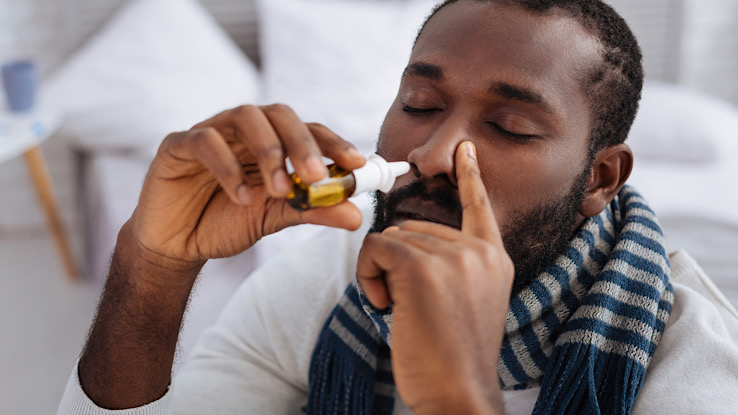
Glands in your nose and the back of your throat constantly produce mucus to capture foreign particles and debris as well as moisten the air you breathe. However, it can be quite uncomfortable when excessive mucus gathers and drips down your throat. This is called “post-nasal drip.” If a post-nasal drip is causing you to have a sore throat or nasal congestion, read on to learn how to stop your post-nasal drip.
What Is a Post-Nasal Drip?
The mucus produced by glands in your nose and throat collects debris and other particles before being sent to the back of your throat and swallowed. This is a healthy and normal process, but it is called post-nasal drip, when excessive mucus accumulates and drips down your throat.
Post-nasal drip causes a sore or itchy throat or even hoarseness. It may also cause you to have the constant urge to swallow or clear your throat. Other symptoms of post-nasal drip include:
- Swollen tonsils or other tissues of the throat
- Dripping sensation at the back of your throat
- Bad breath
- Cough
- Nausea or vomiting
- Ear ache
Causes of Post-Nasal Drip
There are many causes of post-nasal drip, but a major reason is allergies. Allergens cause the inside of your nose to become irritated, inflamed, and swollen, resulting in increased mucus production. However, this can also happen in response to other things such as:
- Bacterial infections
- Viral infections, such as a cold or flu
- Sinus infections
- Smoking
- Breathing dry or cold air
- Dehydration
- Changes in the weather, like humidity, temperature, wind
- Chronic acid reflux
- Bacterial infections
- Medications that thicken mucus
- An oversensitive nose
- Deviated septum
- Pregnancy
- Age
- Spicy foods
Fortunately, there are many over-the-counter treatments and home remedies to stop your post-nasal drip. However, there are times when you need to see a doctor.
Home Remedies To Stop Your Post-Nasal Drip
Nasal Rinse
A nasal rinse (also called sinus irrigation or saline lavage) can keep your nasal passages clear by washing out debris and thick mucus. This will reduce the spread of infections and make you more comfortable by moistening your nasal tissues and help stop your post-nasal drip.
You have probably seen the small teapot-shaped (Neti pots) or other squeeze bottle-type devices marketed as nasal rinse aids. You can get these online or at your local pharmacy, along with the saline packets you need to add to the water. It is also possible to make your own saline solution if you prefer. The directions for the use and care of these nasal-rinse devices are typically fairly simple. However, using clean water (sterile, distilled, or previously boiled) is extremely important.
Drink More Water
Drinking more water can help if dehydration is the cause of your post-nasal drip. The best way to determine if you’re drinking enough water is to check your urine. It should be pale yellow or clear—any darker than a pale yellow means you need to drink more water.
Use a Humidifier
Breathing dry air can cause post-nasal drip. Try using a humidifier in the rooms of your home where you spend the most time and in your bedroom at night while you’re sleeping. You can also try breathing in the steam from a hot shower.
Stop Smoking
Smoke can irritate your respiratory system and cause post-nasal drip. If you smoke, ask your doctor about ways to help you quit. There are many programs and medications available. It is also important to avoid secondhand smoke.
Avoidance
If allergies bring on your post-nasal drip, the best treatment is to avoid the allergens that trigger your symptoms. For example, if you’re allergic to pollen or mold, try to avoid spending time outside on days with high pollen or mold counts. If you have to venture out on such days, change your clothes and take a shower as soon as you get back inside. If you’re allergic to dust, keep your home dust-free by cleaning and changing air filters often.
Elevate
Prop up your head at night with pillows (about 6 inches). This will not only alleviate post-nasal drip but will also keep acid reflux at bay. If acid reflux is the reason for your post-nasal drip, do not eat or drink 3 hours before bedtime and limit alcohol and caffeine. You may also try over-the-counter antacids or acid blockers. If your acid reflux doesn’t go away, see your doctor.
Medications To Stop Your Post-Nasal Drip
Many over-the-counter medications can help with post-nasal drip. Some examples include:
Oral Decongestants
- Pseudoephedrine (Sudafed)
- Phenylephrine (Sudafed PE)
Antihistamines
- Diphenhydramine (Benadryl)
- Cetirizine (Zyrtec)
- Loratadine (Claritin)
- Levocetirizine (Xyzal)
- Chlorpheniramine (Chlor-Trimeton)
- Desloratadine (Clarinex)
- Fexofenadine (Allegra)
Mucus-Thinning Agent
- Guaifenesin (Mucinex)
Nasal Sprays
- Oxymetazoline (Afrin)
Prescription Nasal Sprays
- Beclomethasone (Beconase)
- Triamcinolone (Nasacort)
- Ipratropium (Atrovent)
Other treatments for post-nasal drip depend on the specific cause. For example, antibiotics may be needed for bacterial infections.
When To Call Your Doctor
If home remedies, over-the-counter medications, and sprays don’t help alleviate your post-nasal drip, it’s time to call your doctor. You may require additional treatment if your post-nasal drip is due to an infection or another more serious cause. If it is the result of unrelenting allergies, there are medications that your doctor can prescribe.
Other symptoms can be a sign of something more serious. Call your doctor if you have a fever, bloody or bright-colored mucus, wheezing, bad-smelling drainage, or shortness of breath.
Resource Links:
- “Post-nasal drip” via Cleveland Clinic
- “Treatments for post-nasal drip” via Harvard Health Publishing
- “Post-nasal drip” via ENT Health
- “Saltwater washes (nasal saline nasal or irrigation) for sinusitis” via University of Michigan Health
- “Is rinsing your sinuses with neti pots safe?” via FDA
- “Finding relief from post-nasal drip” via MedStar Health
- “Drinking enough water” MyHealth Alberta.





